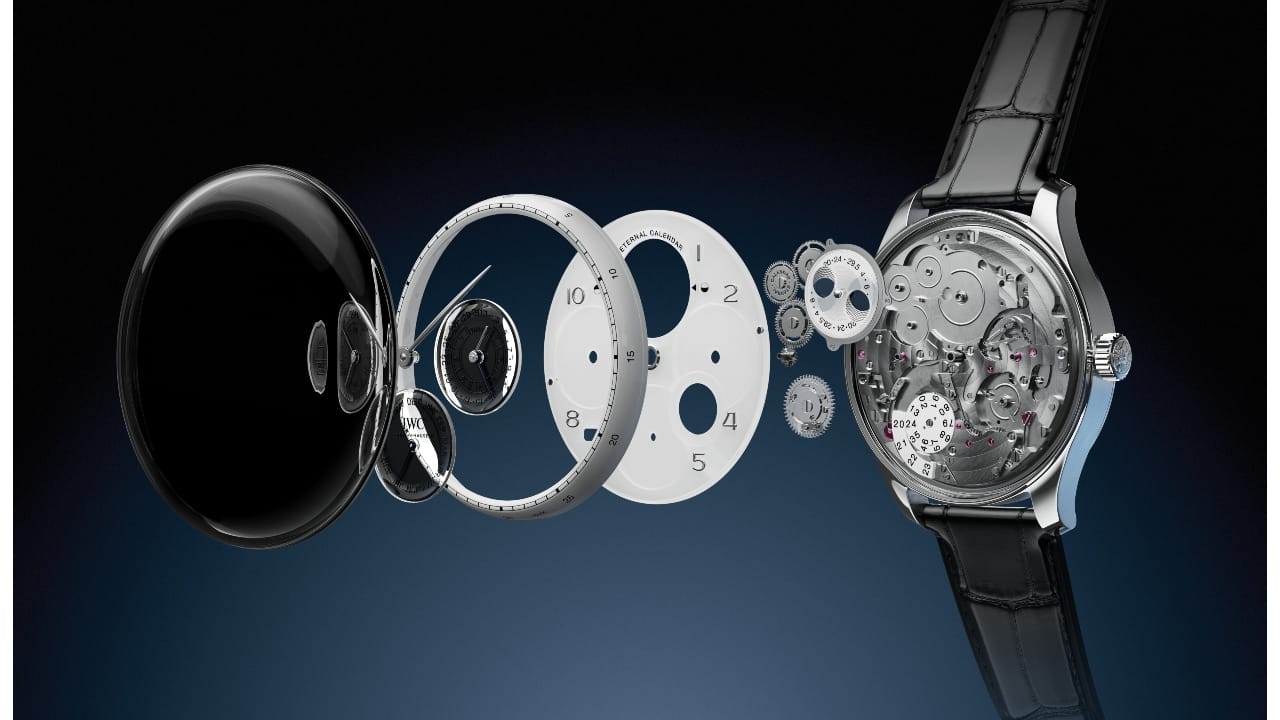The results are in: last November, at the 2024 Grand Prix d’Horlogerie de Genève (GPHG) awards, IWC Schaffhausen won the ‘Aiguille d’Or’. This is the most prestigious prize at the most prestigious awards ceremony of the industry—watch of the year, essentially, and it went to IWC’s Portugieser Eternal Calendar.
The Eternal Calendar solves one of the Gregorian calendar system’s maddening quirks. Normally, a leap year—one which adds an extra day in the month of February—arrives once every four years. But every 100 years, a leap year is skipped—except that every 400 years, a leap year is not skipped. A typical perpetual calendar will not be able to take this into account and, hence, requires a correction three times in 400 years; however, the Eternal Calendar is able to, thanks to a special gear that completes a single revolution in 400 years. It will remain accurate until at least the year 3999, as no decision has yet been made on whether the year 4000 is a leap year or not.
It takes incredible precision to engineer and implement something that needs to remain accurate over such a long period of time. Markus Bühler (pictured above), associate director of watch & movement assembly at IWC Schaffhausen, explains that the development of this system was a multi-year, cross-departmental project. “Developing a movement is always really challenging,” he says. “In the Eternal Calendar, we found that this 400-year wheel had to be very precise in shape. Therefore, we chose a special technology to produce the part, called LIGA.” This involves the metal component being grown on a silicon wafer, which allows the fabrication of highly detailed parts.

The assembly of the 400-year-wheel also poses a challenge for watchmakers because of the small size of the parts involved, and the adjustment that is required. “You have to make sure that the perpetual calendar turns into an Eternal Calendar and, exactly on the first shift in 2100, we have to make sure the leap year turns into no leap year,” Bühler says. “This needs a lot of attention from the watchmaker to not do something wrong.”
The intricate LIGA-produced 400-year wheel of the IWC Eternal Calendar, a testament to modern watchmaking technology and engineering excellence.
The other eyebrow-raising feature of the Eternal Calendar is its moonphase complication, which will be accurate for an incredible 45 million years, made possible thanks to a geartrain of very specific design. This was accomplished thanks to extensive computer simulations that tested 22 trillion different combinations of gears. “The challenge there is to find out which gears, which ratios, that allow the accuracy of 45 million years, that you can bring into the space that we have, and which combination of these that you can produce,” Bühler explains.
View more of the watch
The perpetual calendar has been an integral part of IWC Schaffhausen since it launched its renowned Kurt Klaus-developed take on the complication in 1985, and the manufacture has innovated consistently since then. “For us at IWC, as passionate watchmakers, we are always pushing the boundaries, to not be comfortable with what we have,” Bühler says, pointing out that the Gregorian calendar has been the standard for a long time and, therefore, this 400-year correction was, in a sense, the obvious path forward. “It’s a challenge, and we always take the biggest challenge.”
When Bühler was working on a perpetual calendar for the first time as a young apprentice, he would not have thought that something like the Eternal Calendar was possible. But what does he think of the future now? “There is always young talent, and IWC is very famous for developing young talent,” he says. “At some point, if a young talent says, ‘hey, we can do something more precise’, I don’t know [what it might be], but I’m open to hearing it!”








